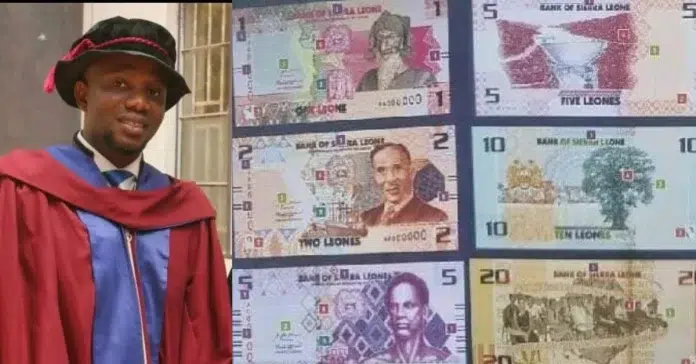Dr. Ezekiel K. Duramany-Lakkoh, who is the Dean, Faculty of Management Sciences at the Institute of Public Administration and Management, University of Sierra Leone has expressed his view on the re-denomination of the Leone which is slated to take place on the 1st July 2022.
According to him, the problem is not redenomination, but how it is implemented. Proponents of currency recalibration techniques have argued that if implemented properly by introducing further counter-inflationary and monetary policies, redenomination will lead to a new exchange rate which will create creditworthiness in the economy and make Sierra Leone looks stronger in international capital markets.
“I have spent some time reading through the literature on redenomination and I find the article by Lianto and Suryaputra (2012) very interesting,” he pointed out.
He continued that while the currency of Sierra Leone like many other countries within the sub-region and beyond remains volatile against hard international currencies like the United States Dollar, the British Pounds, and the Euro, amidst the COVID-19, the country’s Central Bank has resorted to recalibrate the Leone, in a way that will reduce the volume and transactions cost, while maintaining the same value.
Dr. Ezekiel K. Duramany-Lakkoh pointed out that such a strategy will also attempt to address inflation, which might in turn address the balance of trade, budget deficit, and public debt maintenance costs.
He furthered that the practice of re-denominate the country’s currency would definitely be confusing in an economy like Sierra Leone, but other countries including Ghana, Russia, Hungary, Zimbabwe, Greece, Germany, Yugoslavia, China, Nicaragua, Congo, Bolivia, Peru, Angola, Turkey, Georgia, Ukraine, Venezuela, Taiwan, Ecuador, Indonesia, Austria, Argentina, Poland, Romania, and very recently in Belarus have redenominated their currencies, with some economic costs, and positive outcomes.
The Dean said interestingly, the discussion around social media and the Press at large have still not discussed how redenomination would be useful to the overall economic performance and how the issues of reduced currency burden will quantitatively ease and manages transaction in the economy.
He maintained that like quantitative easing techniques employed by developed economies, where interest rates are adjusted even to zero to address capital market structures, and hard currencies are introduced to buy off toxic assets, currency redenomination has its own impact on the balance of trade, budget deficits, public debts maintenance costs, and hyperinflation. There will never be an economic recovery without cost, especially in the short or medium term.
“Actors within the national economic, political and social landscape should also understand that redenomination of the currency will not out-rightly solve our economic situation, which I believe will only be solved by an expanded private sector, ready and willing to innovate human resource, with the ability to take risk within the framework of a strong business legal structures,” he said.
According to him, a perfect economy will only come with the right mindset, a disciplined private sector, combined with an innovative human resource that will be able to transact with very little political Government intervention.
“This should be an understanding requirement of the average elite, regardless of our fields of study,” he underscored adding that the world economy is at a crossroads and most countries are technically in recession.
He highlighted that economic jurisdictions are exploring avenues to adjust inflationary pressure at least to keep employment and a basic standard of living during the COVID-19. For the very first time, the world saw a negative oil price in 2020 and a bigger recession than in 2007.
“Therefore, multinational corporations, companies, SMEs, commercial outlets, and even households should be spending more time planning on how to absorb the operational shock and make the best use of the options available, while Government should pay serious attention to the phased rollout of its redenomination strategy, especially on pre-redenomination speculation transactions,” he recommended.
He added that there is no outright answer to an economic crisis in the short term and any measure taken by any Government to make adjustments will have its short-term implications.
“However, those who are keeping their hard currencies will bring them out to the Banks,” he expressed optimism stating that now is the time to know where the monies are hidden.




